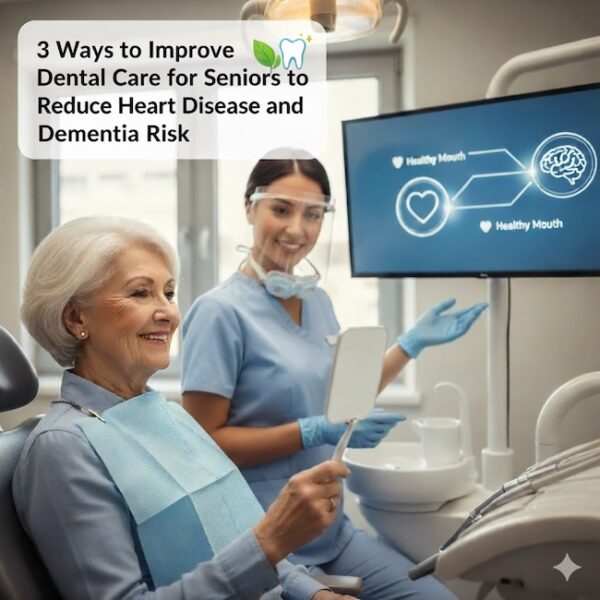When caring for an aging loved one, dental health can easily slip down the priority list, overshadowed by more pressing medical concerns. But the truth is, oral health is a window to overall health.
Discomfort from gum disease, cavities, or ill-fitting dentures can affect everything from nutrition and speech to self-esteem and even heart health. The good news? Significant improvements don't have to be complicated.

Let's explore three surprisingly simple ways you can help protect your loved one's smile, comfort, and well-being, starting today.
Improving Dental Health Improves Overall Health
Caring for your older adult’s teeth isn’t always easy, especially for those with severe health conditions like dementia or stroke.
But keeping their mouth healthy is just as important as caring for the rest of their body because dental health seriously affects overall physical health, nutrition, and well-being.
A healthy mouth helps seniors keep more of their natural teeth, so it’s easier to eat, reduces the risk of pain and inflammation, and reduces the risk of severe conditions like heart disease, pneumonia, and Alzheimer’s disease.
To improve your older adult’s dental health, we share three tips that make it easier to keep teeth and gums healthy.
3 Tips for Improving Dental Care for Seniors
1. Get an Electric Toothbrush
Arthritis, hand tremors, or weakness can make it very difficult to brush teeth thoroughly.
To make it easier, have your older adult use an electric (automatic) toothbrush. Less hand strength and control are needed, and it takes the work out of brushing.
Some toothbrushes even have built-in timers, so there’s no need to guess how long to brush.
Some options:
- $16 Oral-B Pro-Health Clinical (AA battery)
- $35 Oral-B Vitality FlossAction Powered by Braun (rechargeable electric)
- $40 Philips Sonicare 4100 Power Toothbrush (rechargeable electric)
- $50 Oral-B Pro 1000 Powered by Braun (rechargeable electric)
2. Brush or Rinse After Meals
Seniors tend to produce less saliva due to medication side effects and the natural effects of aging.
And after meals, trapped food particles can quickly become bacteria breeding grounds.
Minimize bacteria in your older adult’s mouth by getting them into the habit of brushing (or at least rinsing) about 30 to 60 minutes after eating (not immediately after the meal).
For many people, that’s about the time they’ll need to use the toilet so that they can take care of two tasks with one trip to the bathroom.
3. Change to a Saltwater Rinse
Using salt water to rinse the mouth instead of plain water is an effective way to improve dental health for seniors.
A saltwater rinse increases the pH balance of the mouth. This makes it more difficult for bacteria to grow.
Just add about a half teaspoon of salt to a cup of warm water, stir, and use as a mouth rinse.
It’s also less irritating to the mouth than a store-bought mouthwash – and cheaper too!
Final Thoughts
Remember, protecting your loved one's dental health is a fundamental part of protecting their quality of life. These three simple strategies are more than just about a healthy smile—they're about ensuring they can eat comfortably, smile with confidence, and avoid preventable pain.
You don't need a drastic overhaul to make a real difference. Start by incorporating just one of these tips this week. A slight change in your caregiving routine can lead to a monumental boost in their daily comfort and health.
Recommended for you:
- Why Do Seniors Lose Their Appetites? 10 Possible Reasons
- 3 Top Benefits of a Daily Routine for Seniors
- 7 Tips to Get Someone with Dementia to Shower
This article reflects prices at the time of publication, but prices and availability may change. This article contains affiliate links. For more information, see How We Make Money.
About the Author

Connie is the founder of DailyCaring.com and was a hands-on caregiver for her grandmother for 20 years. (Grandma made it to 101 years old!) She knows how challenging, overwhelming, and all-consuming caring for an older adult can be. She also understands the importance of support, especially in the form of practical solutions, valuable resources, and self-care tips.













